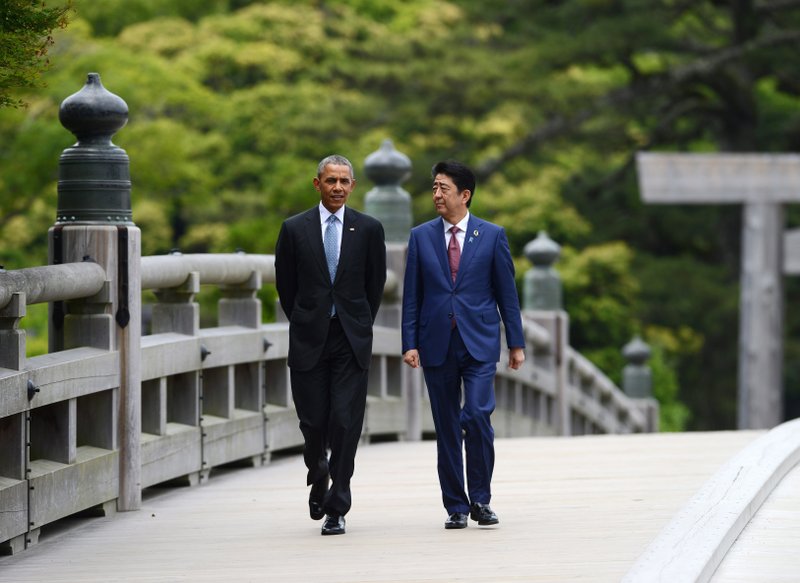ISE, Japan -- The leaders of the Group of Seven industrialized nations pledged this morning to "collectively tackle" major risks to global growth, including direct political threats to the international order from terrorist attacks, violent extremism and refugee flows.
G-7 leaders -- from the United Kingdom, Canada, France, Germany, Italy, Japan and the U.S. -- wrapped up their annual summit this morning in central Japan with a declaration that claimed a "special responsibility" for leading international efforts to cope with those challenges.
They committed to a cooperative approach in beefing up policies to stimulate and sustain growth of their sluggish economies with use of flexible-spending strategies to create jobs and shore up confidence in uncertain times.
"Weak demand and unaddressed structural problems are the key factors weighing on actual and potential growth," the statement said. "We have strengthened the resilience of our economies in order to avoid falling into another crisis and to this end commit to reinforce our efforts to address" current economic conditions.
"We remain committed to ensuring that growth is inclusive and job-rich, benefiting all segments of our societies," it said.
The wording of the leaders' declaration papers over differences on the issue of expanding fiscal stimulus by saying each will take into account "country-specific circumstances" in committing to stronger policies to support their economies. Germany, in particular, has balked at committing to expansionary fiscal policy.
The declaration includes a reference to the need to ensure debt is "on a sustainable path."
The talks followed an urgent appeal by the host, Japanese Prime Minister Shinzo Abe, to avert another global crisis. Abe compared the current global economic situation to conditions just before the 2008 financial crisis, saying vigilance is crucial for averting a relapse.
"We learned a lesson that we failed to respond properly because we did not have a firm recognition of the risks," Abe said Thursday.
President Barack Obama backed Abe's call, saying it was crucial not just to put people back to work but also raise wages and maintain the momentum of the recovery.
"We've all got a lot of work to do and we agreed to continue to focus on making sure that each country, based on its particular needs and capacities, is taking steps to accelerate growth," Obama said.
The leaders also expressed concern over territorial tensions in the East and South China seas. The declaration does not mention China and its expansion into disputed areas specifically, but calls for respecting freedom of navigation and of overflight and for resolving conflicts peacefully through law.
Japanese officials also highlighted joint efforts on corruption, terrorism, global health and migration -- which has become a huge headache especially for European nations -- as other top priorities.
On Thursday, German Chancellor Angela Merkel had said she didn't expect any concrete offers in the final communique from other G-7 members to take in refugees. She did say, however, that she had a bilateral meeting with Canadian Prime Minister Justin Trudeau and told him how much she appreciates the large number of refugees his country is taking in.
"One has to consider that Canada isn't right next to Syria and yet it still feels responsible for the problems there," she said.
Merkel and Trudeau also discussed a looming Canadian-European Union trade pact, anti-terrorism efforts, migration and "Russian interference in Ukraine," according to a statement released by Trudeau's office. The statement made no reference to talk of austerity or the slumping global economy, while Trudeau was said to have called for investment in a separate meeting of all G-7 leaders.
"It's not a question of whether to make investments, but what we are making investments in," Trudeau told the leaders in the private meeting, according to a written summary released by spokesman Cameron Ahmad. "How are we using fiscal policy in line with our various capacities is going to be incredibly important."
Information for this article was contributed by Aritz Parra, Koji Ueda and Frank Jordans of The Associated Press and by Patrick Donahue and Josh Wingrove of Bloomberg News.
A Section on 05/27/2016
